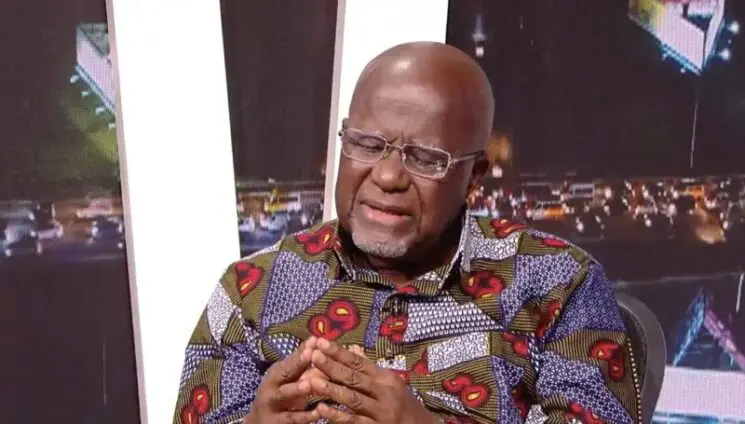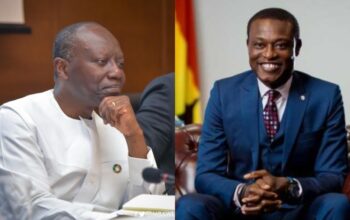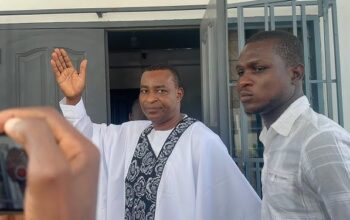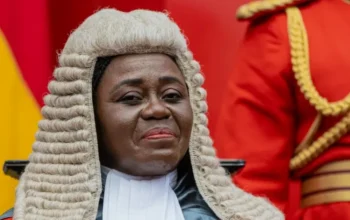Hackman Owusu-Agyemang, a senior figure in Ghana’s New Patriotic Party (NPP), reportedly made a comment about the opposition National Democratic Congress (NDC) about their criticisms of the Electoral Commission (EC) of Ghana. He suggested that even if a universally revered figure, like Jesus Christ, were appointed as the Chair of the EC, the NDC would still find reasons to complain.
This remark is likely a response to the persistent criticisms from the NDC regarding the actions and decisions of the Electoral Commission, particularly concerning electoral processes. The NDC has frequently raised concerns about the perceived neutrality and transparency of the EC, especially during elections. Owusu-Agyemang’s comment reflects the NPP’s frustration with these criticisms, implying that no matter who leads the EC, the opposition would continue to question its actions.
This kind of rhetoric is not uncommon in politically charged environments where both the ruling party and the opposition exchanged criticisms over election-related issues. The comment highlights the deepening political divide between the NPP and NDC, especially regarding the management of elections and electoral bodies. Hackman Owusu-Agyemang’s comment about the NDC complaining “even if you bring Jesus as EC Chair” is a response to what the NPP perceives as the NDC’s consistent criticisms of the Electoral Commission (EC) under its current leadership. The NDC has, for years, raised concerns about the impartiality and conduct of the EC, especially during election periods. This includes allegations about the EC’s management of voter registration, the printing of ballots, and the general administration of elections, which the NDC claims often favour the ruling party.
In particular, the NDC has been vocal about the leadership of the EC under Jean Mensa, whom they allege has demonstrated partiality in favour of the NPP. This ongoing tension has led to claims from both sides that the EC is either overstepping or not doing enough to ensure fairness.
Owusu-Agyemang’s comment is a rhetorical device aimed at suggesting that no matter who is at the helm of the EC—whether an esteemed and universally respected figure like Jesus Christ—the NDC would still find grounds for dissatisfaction and claims of bias. This highlights the deeply polarized nature of Ghanaian politics, particularly around elections, and the difficulty in finding common ground on electoral matters.
This type of comment is often used in Ghanaian political discourse to underscore the frustration of the ruling party with what they see as unfounded or exaggerated complaints from the opposition, especially when it comes to election-related controversies. It serves as a reminder of the deep-seated political tensions that often accompany Ghana’s elections and the challenge of achieving consensus or trust in institutions like the EC. Hackman Owusu-Agyemang, the Chairman of the NPP National Council of Elders, has sharply criticized the opposition National Democratic Congress (NDC) for what he describes as their persistent tendency to challenge electoral processes and outcomes. In an interview on Joy News’ PM Express on Monday, November 26, 2024, Owusu-Agyemang expressed his concerns that the NDC’s repeated accusations and objections, regardless of the electoral circumstances, could pose a threat to Ghana’s democratic progress.
Owusu-Agyemang’s comment highlights a long-standing issue between the ruling New Patriotic Party (NPP) and the opposition National Democratic Congress (NDC). The NDC has been critical of the Electoral Commission (EC), particularly regarding elections that have been conducted under the leadership of Jean Mensa. The opposition party has alleged that the EC has been biased and has failed to ensure a level playing field for all political parties, which they argue compromises the integrity of the democratic process.
In his remarks, Owusu-Agyemang accused the NDC of undermining the democratic institutions of Ghana by consistently questioning electoral outcomes and alleging foul play, even when there was no compelling evidence to support such claims. He argued that this posture not only undermines public trust in the Electoral Commission but also harms the overall democratic health of the country.
The NPP chairman’s statement reflects growing frustration within the ruling party, which believes that these ongoing criticisms from the NDC create unnecessary political tension, especially in the lead-up to crucial elections. Owusu-Agyemang’s reference to the situation in Ghana implies that the political climate is becoming more polarized, with both parties increasingly entrenched in their positions.
Overall, Owusu-Agyemang’s criticism points to a broader concern about election-related tensions and the risk of eroding public confidence in the electoral system. The challenge for Ghana’s democracy is finding a way to address these disputes constructively, ensuring transparency and accountability while maintaining the integrity of its democratic institutions.
Hackman Owusu-Agyemang, the Chairman of the New Patriotic Party’s (NPP) National Council of Elders, has expressed his frustration with the opposition National Democratic Congress (NDC) over their continuous challenges to electoral outcomes. In a recent interview on Joy News’ PM Express on November 26, 2024, Owusu-Agyemang lamented the NDC’s stance, which he believes undermines the credibility of Ghana’s democracy.
He criticized the NDC for their repeated claims that if they do not win elections, something must be wrong, describing it as a harmful posture that threatens the integrity of the country’s democratic processes. He specifically pointed out that the NDC’s approach to elections, where they often accuse the Electoral Commission (EC) of bias or manipulation when they lose, erodes public trust in the democratic system.
Owusu-Agyemang went on to make a strong rhetorical statement, saying, “Believe me, if you bring Jesus Christ from heaven to come and become the Electoral Commissioner, they will still complain.” This hyperbole was used to emphasize his point that no matter who oversees the EC, the NDC would likely continue to make accusations of election unfairness. His comment reflects deep frustration within the ruling NPP, who view the NDC’s criticism of the EC as unrelenting and damaging to the credibility of Ghana’s electoral institutions.
Furthermore, Owusu-Agyemang expressed concern that the NDC’s persistent accusations against the Electoral Commission, especially without providing solid evidence, could weaken public confidence in the country’s electoral process. By constantly calling into question the legitimacy of the EC and election results, the opposition risks creating an atmosphere of mistrust that could destabilize the democratic system.
Overall, Owusu-Agyemang’s remarks reveal a broader political dispute between the NPP and NDC, with both parties accusing each other of undermining the democratic process. The ongoing tensions over the Electoral Commission are particularly significant in the lead-up to Ghana’s 2024 General Election, and Owusu-Agyemang’s comments underscore the challenges of achieving political consensus and maintaining trust in the country’s electoral institutions. Hackman Owusu-Agyemang, Chairman of the NPP National Council of Elders, has voiced strong concerns about the negative impact of the opposition’s approach to Ghana’s political and democratic processes. In his recent remarks on Joy News’ PM Express on November 26, 2024, he highlighted the damaging effects of the NDC’s continuous criticisms and challenges to the electoral system, calling them unhelpful to Ghana’s progress. He criticized the threats and complaints from the opposition, stating that these actions were not benefiting anyone or contributing positively to the nation’s development.
Owusu-Agyemang connected the NDC’s combative stance to broader dysfunctions within Ghana’s political institutions, specifically pointing to Parliament. He suggested that the opposition’s confrontational tactics were influencing the legislative body, making it difficult for Parliament to function effectively. He emphasized that Parliament belongs to the people of Ghana and not to the Speaker or any individual politician. He urged the lawmakers to prioritize the people’s needs and work collaboratively for the country’s benefit rather than being entrenched in partisan battles.
The former Foreign Minister also expressed his deep frustration over the state of Ghana’s political environment, reflecting on his personal experiences. He candidly admitted that, at times, he feels like crying when he thinks about the state of the country. Despite his accomplishments abroad, including serving with the United Nations for 20 years, where he reached the position of chief and was close to becoming the Director-General of the Food and Agriculture Organization (FAO), Owusu-Agyemang returned to Ghana with a hope of applying the lessons and experience he gained to improve the country’s political landscape.
However, he expressed disappointment that political challenges and dysfunctional institutions have prevented the nation from progressing as he had hoped. Reflecting on Ghana’s history, he acknowledged the military interruptions that disrupted the nation’s political evolution, but he stressed the importance of continuing to build on the progress made since the return to civilian rule. He reiterated his belief that Ghana could become a great nation that commands respect across Africa and the world.
In essence, Owusu-Agyemang’s remarks serve as both a criticism of the current political environment and a call for reform. He believes that for Ghana to truly move forward, there needs to be a shift in the way politics is conducted—one that focuses on unity, respect for institutions, and a commitment to national progress.









